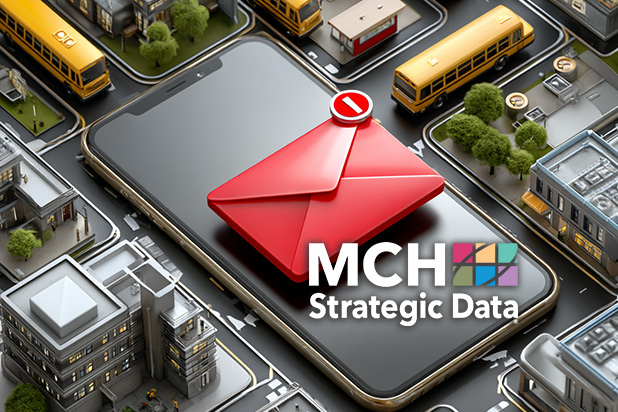
May 19, 2025 | Peter Long
New Bulk Email Sending Standards for Outlook and Gmail
Never miss a Moment: Sign up for MCH's Monday Marketing Moment here!
If your organization relies on email marketing to reach educators, 2025 brings additional critical changes that demand your attention. MCH Strategic Data published a blog post back in December 2024 about changes that Google’s Gmail system were making and now we want educational marketers to know that Microsoft has adopted similar standards – effective immediately.
For marketers targeting schools and districts - many of which use Outlook or Google email systems (Approximately 85%), these changes are not optional. They’re essential for ensuring your campaigns are delivered, opened, and acted upon.
Failing to adapt could land your emails in junk folders - or worse, get your domain blacklisted. Here’s what you need to know and why it matters for educational marketers.
Why the Rules Are Changing
Both Gmail and Outlook are tightening their email authentication policies to combat phishing, spoofing, and spam. Educational institutions are high-value targets for cyber threats, and their IT departments are raising the bar on what gets through to inboxes. These changes aim to protect users while ensuring that only trusted, verified senders reach recipients.
As a result, both platforms now require high-volume senders (defined as sending more than 5,000 emails per day – per platform) to implement a trio of email authentication protocols:
- SPF (Sender Policy Framework) – Confirms your emails come from authorized IP addresses.
- DKIM (DomainKeys Identified Mail) – Validates that your messages haven't been altered in transit.
- DMARC (Domain-based Message Authentication, Reporting & Conformance) – Tells receiving servers how to handle messages that fail SPF or DKIM checks.
If your domain doesn’t comply with these standards, your emails may be marked as junk or blocked entirely. These are technical email standards, so confirm with your email deployment experts and make sure necessary changes are made immediately.
What Outlook Is Now Requiring
Starting May 5, 2024, Microsoft is enforcing stricter email authentication for senders targeting Outlook inboxes. If you’re sending more than 5,000 recipients a day, Outlook now requires:
- Passing SPF, DKIM, and DMARC checks.
- Properly aligned “From” or “Reply-To” addresses that accurately represent your domain and are capable of receiving responses.
- Functional unsubscribe links that allow recipients to easily opt out.
- Clean mailing lists and bounce management to avoid high bounce rates and complaints.
- Transparent messaging with no deceptive headers or subject lines.
Noncompliant messages will first be diverted to spam. Continued noncompliance will result in message rejection with a “550; 5.7.515 Access denied” error.
Implications for Educational Marketers
Educational marketers already face unique challenges. District email systems are governed by centralized, security-conscious IT administrators. Bulk promotional sends can be flagged quickly—especially if bounce rates are high or engagement is low.
Given that many school systems operate under either Gmail or Outlook domains, complying with these new standards isn’t just a best practice, it’s a requirement for survival.
In fact:
- High bounce rates can result in blocks.
- Spam rates must remain below 0.1%.
- Engagement rates below 0.5% may trigger filters.
- Poor list hygiene can damage sender reputation long-term.
If your domain gets blacklisted, recovering your reputation can be time-consuming and costly.
Action Steps to Stay Compliant (and Competitive)
Here’s what educational marketers should do immediately:
1. Audit Your DNS Settings
Make sure SPF, DKIM, and DMARC records are properly configured for your domain. You may need IT or your email service provider to assist, but this step is non-negotiable.
2. Verify Your Sender Identity
Use a branded sending domain. Avoid using free or mismatched domains like Gmail or Yahoo for marketing. Ensure reply-to addresses are valid and monitored.
3. Clean Your Lists
Regularly validate and scrub your email lists. Remove catch-all domains and unengaged users to maintain your domain’s reputation.
4. Include One-Click Unsubscribes
Make it simple for educators to opt out. Not only is this required, but it also reduces complaints and spam reports.
5. Throttle and Segment Sends
Spread out sends over time, and avoid blasting entire lists at once. This is particularly important when sending to districts that monitor volume and bounce spikes.
6. Test Before You Send
Use spam-check tools and test messages through authentication validators. This helps ensure your campaign passes the filters before you launch.
Final Thoughts: Responsible Marketing Wins
Educational institutions are counting on marketers to respect their digital environments. At the same time, marketers can’t afford to waste resources on campaigns that never land in an inbox. These new authentication standards are not barriers, they’re blueprints for building trust and ensuring deliverability.
At MCH Strategic Data, we’re committed to helping you adapt to these evolving standards with accurate educator lists, compliance guidance, and strategic support. By embracing these changes, you’re not just meeting requirements, you’re securing your place in the inbox and in the educator’s mind.
For support in optimizing your campaigns for compliance and effectiveness, contact us at 800-776-6373 or info@mchdata.com.
Need More Time?
Due to inactivity, you will be logged out within 5 minutes.
To stay logged in, please select Stay Logged In.





 Logout
Logout